牛津译林版(2019)必修 第一册Unit 2 Let's talk teens Extended reading课件(共58张PPT 内嵌视频)
文档属性
| 名称 | 牛津译林版(2019)必修 第一册Unit 2 Let's talk teens Extended reading课件(共58张PPT 内嵌视频) |
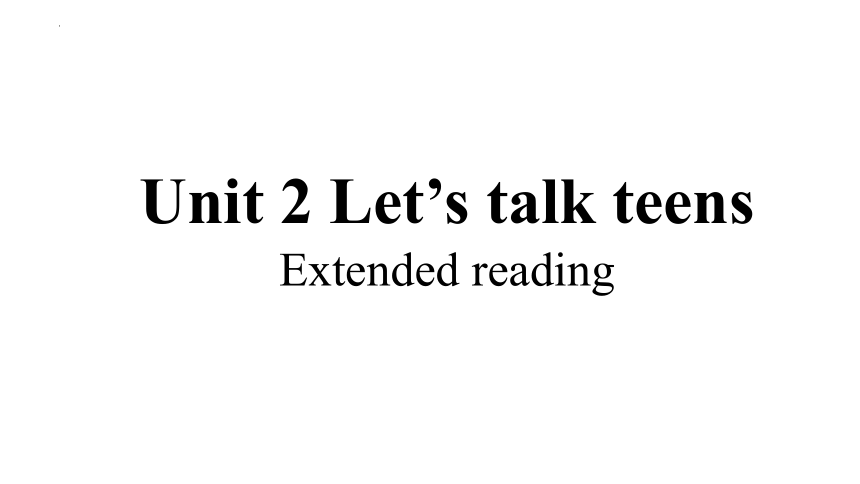
|
|
| 格式 | pptx | ||
| 文件大小 | 43.6MB | ||
| 资源类型 | 教案 | ||
| 版本资源 | 牛津译林版(2019) | ||
| 科目 | 英语 | ||
| 更新时间 | 2023-10-30 16:40:03 | ||
图片预览

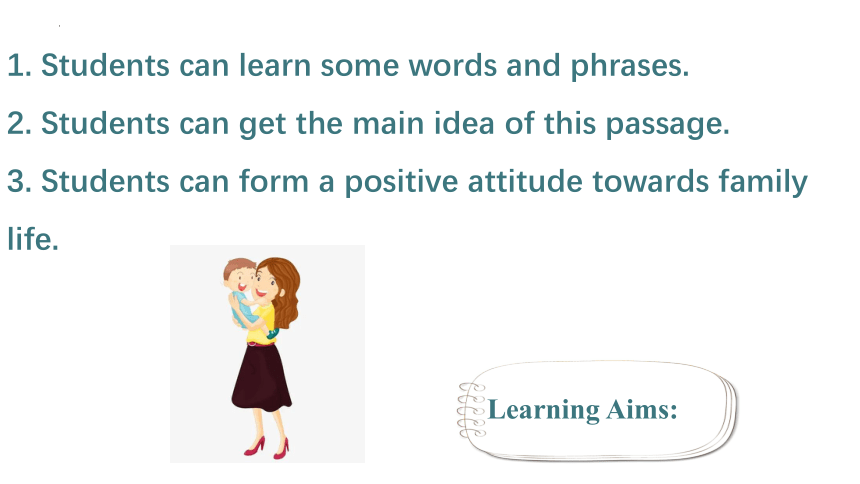
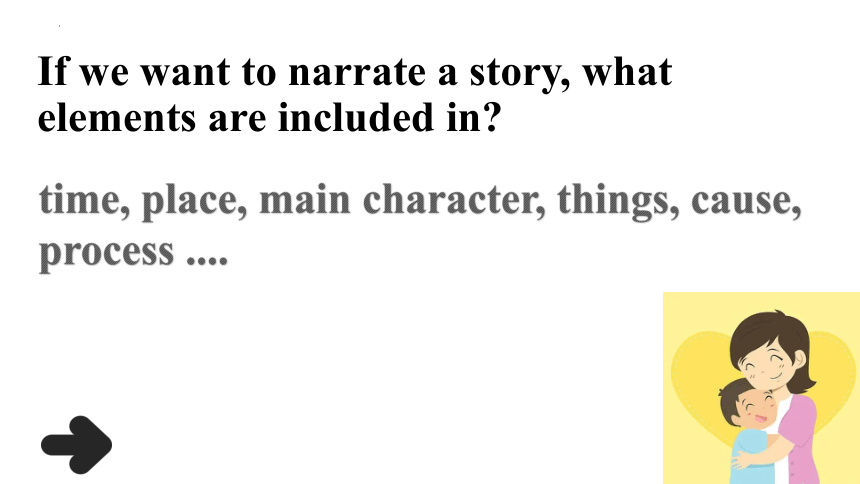
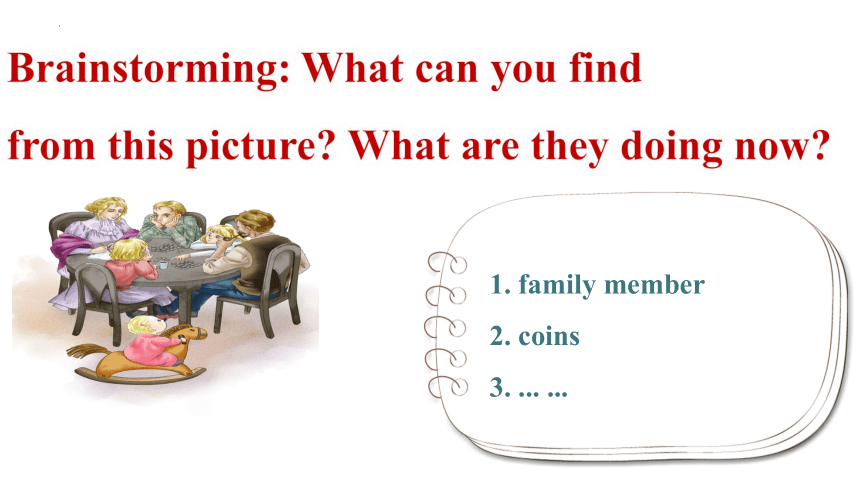
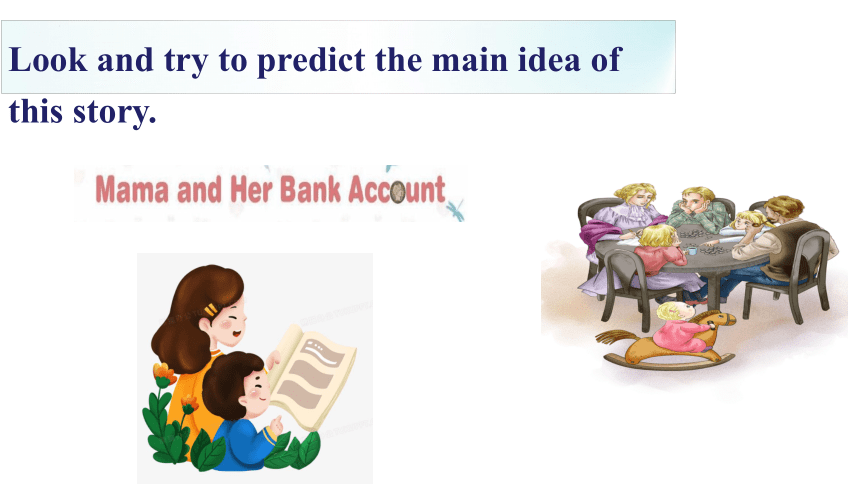

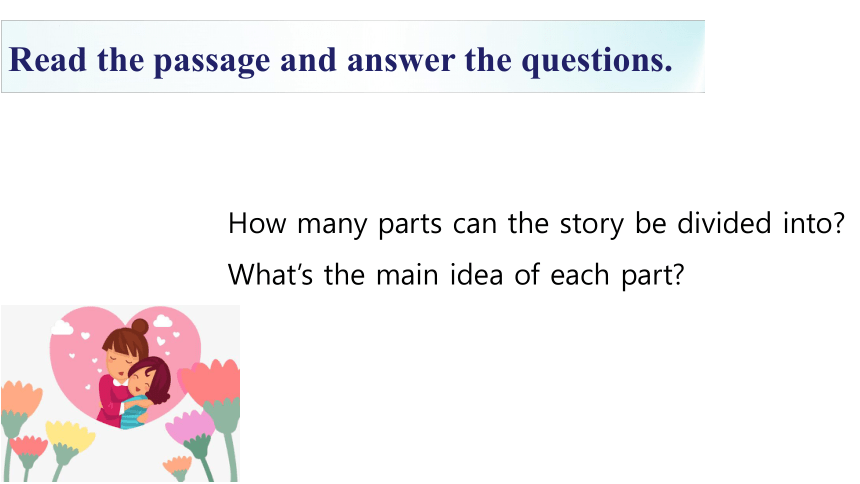
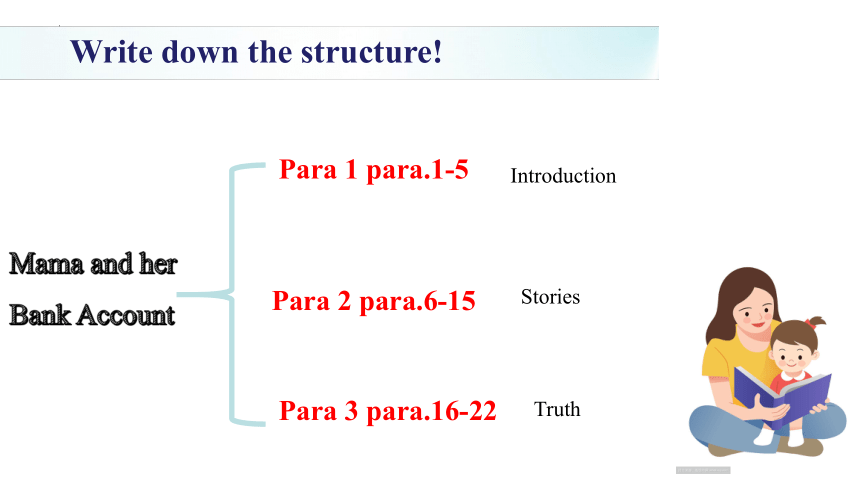
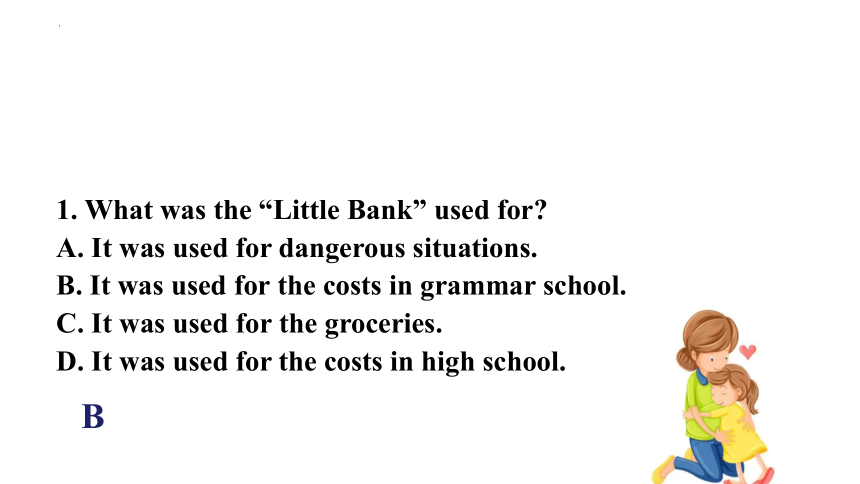
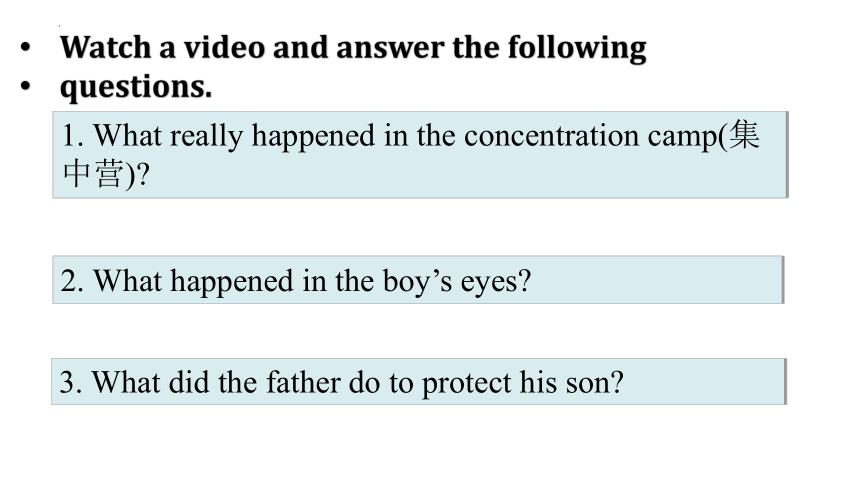

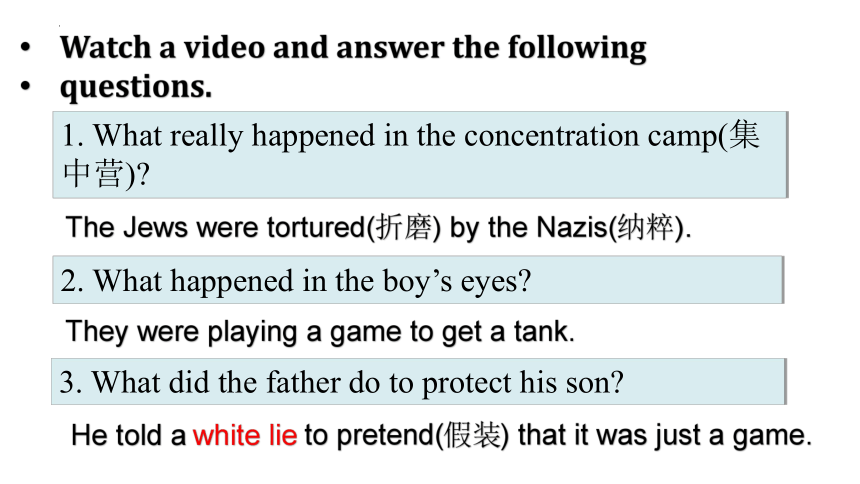
文档简介
(共58张PPT)
Unit 2 Let’s talk teens
Extended reading
1. Students can learn some words and phrases.
2. Students can get the main idea of this passage.
3. Students can form a positive attitude towards family life.
Learning Aims:
If we want to narrate a story, what elements are included in
time, place, main character, things, cause, process ....
Brainstorming: What can you find
from this picture What are they doing now
1. family member
2. coins
3. ... ...
Look and try to predict the main idea of
this story.
Does Mama’s Bank Account exist
No, it doesn't.
Read the passage and answer the questions.
How many parts can the story be divided into What’s the main idea of each part
Write down the structure!
Para 1 para.1-5
Para 2 para.6-15
Para 3 para.16-22
Introduction
Stories
Truth
Mama and her Bank Account
1. What was the “Little Bank” used for
A. It was used for dangerous situations.
B. It was used for the costs in grammar school.
C. It was used for the groceries.
D. It was used for the costs in high school.
B
2. What happened in the boy’s eyes
1. What really happened in the concentration camp(集中营)
3. What did the father do to protect his son
Watch a video and answer the following
questions.
La Vita è bella(美丽人生)
2. What happened in the boy’s eyes
1. What really happened in the concentration camp(集中营)
3. What did the father do to protect his son
Watch a video and answer the following
questions.
The Jews were tortured(折磨) by the Nazis(纳粹).
They were playing a game to get a tank.
He told a white lie to pretend(假装) that it was just a game.
What is a white lie
a harmless or small lie, especially one that you tell to avoid hurting sb.
Kathryn Forbes’s Mama’s Bank Account
(Adapted from Kathryn Forbes’s Mama’s Bank Account, which has 17 short stories and describes the struggles and dreams of a family in San Francisco in the early 1900s)
Basic elements of a short story
Setting the time and place in which it happens.
Characters a person, or sometimes even an animal, who takes part in the action of a short story.
Plot a series of events and character actions that relate to the central conflict(冲突).
Theme the central idea or belief in a short story.
Review: Basic elements of short story
背景
人物
情节
主题
Predict
Mama’s love for her kids
Make full use of money
How to balance expenses
…
Predict from the title
Analyze the basic elements of the story
Analyze the basic elements
Setting
Characters
Plot
Theme
The US in the early 1900s
Characters
Nels
My little sister
Dagmar
Christine
Me
Papa
Mama
Analyze the basic elements
Setting
Characters
Plot
Theme
The US in the early 1900s
Mama, Papa, Nels, Katrin, Christine, Dagmar
Structure analysis helps
understand the plot
Part 1
Part 2
Part3
Family routine in every Saturday night
Nels wanted to go on high school, while the family didn’t have enough money. Everyone in the family would do something to help Nels go on to high school.
There wasn’t a real bank account and Mama just wanted us to feel secure.
Introduction to Mama’s Bank Account
The challenge we had met and how we overcame it.
Truth of Mama’s Bank Account
Structure analysis
(para 1-5)
(para 6-15)
(para 16-22)
Detailed reading
In Katrin's childhood...
When Katrin was older....
When Nels graduated from ....
How is the article organized
the time order
para 1-5
para 6-15
para 16-22
In Katrin's childhood...
What were the coins used for
LOREM IPSUM
01
rent
02
groceries
03
notebook
04
...
“ Bank account”
How did the children feel about the Bank Account
proud,warm,secure
When Nels graduated from ...
What caused a big financial problem in the family
Nels wanted to go on to high school, but the family had no enough money.
Nels
Papa
The author
would give up smoking.
would look after the children every Friday night with her younger sister.
would work in a grocery after school.
How did they solve the problem
When Katrin was older....
Why did Mama make up such a lie to her children
Because Mama wanted to provide a sense of security to her children and give them the courage to face up difficulties.
Analyze the basic elements
Setting
Characters
Plot
Theme
The US in the early 1900s
Mama, Papa, Nels, Katrin, Christine, Dagmar
In Katrin’s childhood, her family worked hard and supported each other so that they never needed to get money from Mama’s Bank Account. When she was older, Katrin found out that the Bank Account did not exist. Mama made it up to make the children feel secure.
A mother has deep love for her children and does
whatever she can to protect them.
Appreciate the language
1. Is the story writen in the first person or the third person
2. Are most of the sentences in the story long sentences or short sentences
3. Why did the author write the story in this way
Appreciate the language
Short sentences
The first person
It can make the story sound personally true and natural, thus touching the readers deeply.
Mama has shown her children the meaning of bravery, optimism, responsibility, persistence and wisdom.
1. What qualities has Mama shown her children
Discussion
2. What makes a good parent-child relationship
Discussion
A good parent-child relationship should be set up on the basis of mutual understanding and respect. Parents should learn to listen to children's ideas and encourage them to think on their own. The children should also understand their parents' hope in their shoes.
Discussion
3 Have your parents done something that has moved you greatly What was it Share your story.
remember the four elements of a story
setting
character
plot
theme
Retell the story
Every Saturday night ...
When Nels graduated from grammar school ...
Last year I sold my first story.
That was twenty years ago.
Retell the story
课文知识点
Mama and Her Bank Account①
Every Saturday night Mama would sit down by the kitchen table and count out the money Papa had brought home.
每个星期六晚上,妈妈都会坐在厨房的桌子旁,数着爸爸带回家的钱。
本句为复合句。would do表示“过去常常做”。sit, count作并列谓语。Papa had brought home是定语从句,修饰the money。
count out 算出
count on/upon 依靠,指望
countless adj. 数不尽的.
“For the rent.” Mama would count out the big silver
pieces.
“For the groceries.” Another group of coins.
“I'll need a notebook.” That would be my sister Christine, my brother Nels or me.
“(这些是)房租。” 妈妈会数出那些大的银币。
“(这些是)食品杂货用的。”(妈妈数出)另一组硬币。
“我需要一个笔记本。”那会是我的妹妹克里斯蒂娜,我的哥哥内尔斯或是我。
rent:v. 出租 n. 租金 rent… to … 把…出租给…
piece:n. 块;件;篇;硬币
grocery : n. 食品杂货;食品杂货店.
Mama would put one or two coins to the side.
We would watch with anxious interest. At last, Papa would ask, “Is that all?” And when Mama nodded, we could relax a little.
妈妈会把一两个硬币放在一边。我们会焦急地看着那些硬币。最后,爸爸会问:“就这些吗?”当妈妈点头的时候,我们可以松口气了。
put one or two coins to the side 把一两个硬币放在一边
relax v. (使)松弛;放松;(使) 休息;(使)轻松;放宽
relaxed adj. 放松的;得到安宁的
relaxing adj. 缓和的;令人轻松愉快的.
Mama would look up and smile, “Good. We do not
have to go to the Bank.” We were all so proud of Mama's Bank Account. It gave us such a warm, secure feeling.
妈妈会抬头,笑着说:“很好。我们不必去银行了。”我们都为妈妈的银行账户感到骄傲。它给了我们一种如此温暖、安全的感觉。
be proud of =take pride in 以……自豪
secure adj. 安心的;可靠的;牢固的
security n. 安全,平安
such a ... feeling 一种...的感觉.
When Nels graduated from grammar school,
he wanted to go on to high school. "It will cost a little money,” he said.
Eagerly we gathered around the table.
当内尔斯从语法学校毕业时,他想继续上高中。“要花一点钱,”他说。
我们急切地围到桌子边来。
graduate: vi.&vt. 毕业 n. 毕业生 graduation n. 毕业
graduate from 毕业于.
I took down a box and laid it carefully in front of
Mama. This was the “Little Bank”.It was used for sudden emergencies, such as the time when Christine broke her arm and had to be taken to a doctor.
我拿下一个盒子,小心地放在妈妈面前。这是“小银行”。它被用于突发的紧急情况,例如克里斯蒂娜摔断了胳膊,不得不被带去看医生。
take down 取下
lay vt. 放置
in front of 在…前面
emergency n.突发事件,紧急情况
sudden emergency 突发事件,紧急情况.
Nels listed the costs of the things he would need.
Mama counted out the money in the Little Bank. There
was not enough. “We do not want to go to the Bank,”she reminded. We all shook our heads.
“I will work in Dillon's grocery after school,” Nels volunteered.
内尔斯列出了他需要的各项东西的费用。妈妈数着“小银行”里的钱。还不够。“我们不想去银行,”她提醒到。 我们都摇了摇头。“
放学后我将在狄龙的食品杂货店里工作,”内尔斯主动建议。
list: v.列举 n. 清单 make a list 列个清单
shake one's head 摇头
volunteer: vt.&vi. 自愿做,义务做 n. 志愿者
volunteer to do sth. 自愿做某事/主动做某事.
Mama gave him a bright smile and wrote down a
number. “That's not enough,” Papa said. Then he took his pipe out of his mouth and looked at it for a long time. "I will give up smoking,” he said suddenly.
妈妈给了他一个灿烂的微笑,写下了一个数字。“这还不够,”爸爸说。然后他从嘴里拿出烟斗,看了很久。“我戒烟,”他突然说。
write down 写下
pipe n. 烟斗;管子;管乐器
take out of 拿出;取出
give up smoking /get rid of smoking /rid smoking 戒烟.
Mama reached across the table and touched
Papa's arm. Then she wrote down another figure.
“I will look after the Elvington children every Friday night,” I said. “Christine can help me.”
妈妈把手伸到餐桌对面,碰了下爸爸的胳膊。然后她写下了另一个数字。
“我将在每周五晚上照顾埃尔温顿的孩子们,”我说。“克里斯蒂娜可以帮我。”
figure n. 数字;人物;体型,身材
look after=take care of 照顾.
Now there was enough money. We all felt very
good because we did not have to go downtown and draw money out of Mama's Bank Account.
现在有足够的钱了。我们都感觉很好,因为我们不需要去市中心从妈妈的银行账户里取钱了。
downtown: adv. 在市中心,往市中心
go downtown 去市中心
draw sth. out of sth. 提取,支取.
So many things came out of the Little Bank that year: Christine's dress for the school play, my little sister Dagmar's operation...Whatever happened, we always knew we still had the Bank to depend upon.
那一年,小银行里发生了许多事情,克里斯蒂娜的演出服,支付我妹妹达格玛的手术……无论发生什么事,我们总是知道我们还有‘银行’可以依靠。
本句为复合句。whatever引导让步状语从句。we still had the Bank to depend upon是宾语从句,省略了that。
operation n. 手术;运转;操作
depend/rely/count upon/on 依赖,依靠.
whichever
whoever
whenever
wherever
however
whatever引导的让步状语从句
Whatever happened, we always knew we still had the bank to depend upon.
无论发生什么,我们总是知道我们还有“银行”可依靠。
Whatever 无论什么,不管什么
what + ever = no matter what
no matter which
no matter who
no matter when
no matter where
no matter how
That was twenty years ago.
Last year I sold my first story. When the check came,
I hurried over to Mama's and put it in her lap. "For you,” I said, “to put in your Bank Account.”
那是二十年前的事了。
去年我卖了我的第一个故事。拿到支票时,我急忙跑到妈妈家,把它放在她的腿上。“给你的,”我说,“把钱存入你的银行账户。”
check n. 支票;检查
check in 登记入住
check out 结账离开
lap n. 大腿部; (人坐时)膝部;(跑道的)一圈 .
I noticed for the first time how old Mama and
Papa looked. Papa seemed shorter, and Mama's hair was silver now.
“Tomorrow,” I told Mama, “you must take it to the Bank.”
“You will go with me, Katrin?”
我第一次注意到爸爸妈妈看上去是多么老。爸爸看上去似乎更矮了,妈妈的头发如今变成了银色。
“明天,”我告诉妈妈,“你必须把它存到银行里。”
“你和我一起去吗,凯特林?”
“That won't be necessary. Just hand it to the
teller. He'll pay it into your account.”
Mama looked at me. “There is no account,” she said. “In all my life, I've never been inside a bank.”
“没必要。把它交给出纳员。他会把钱存入你的账户。”
妈妈看着我。“我没有银行账户,”她说。“我这辈子从来没进过银行。”
teller n. 出纳员;叙述者
pay ...into one's account 把钱存入某人的账户.
And when I didn't — couldn't — answer, Mama
said seriously, “It is not good for little ones to be afraid — to not feel secure.”
那一刻,我没有说什么,也什么都说不出来,妈妈认真地说:“让小孩子感到害怕,没有安全感,不是一件好事。”
本句是简单句。it是形式主语,真正主语是不定式短语for little ones to be afraid—to not feel secure。破折号起解释作用。
(Adapted from Kathryn Forbes's Mama's Bank
Account, which has 17 short stories and describes the struggles and dreams of a family in San Francisco in the early 1900s)
(改编自凯瑟琳·福布斯《妈妈的银行账户》,里面有17个短篇小说,描述了20世纪初,旧金山一个家庭的奋斗和梦想。)
adapt from: 改编.
Homework
1. Please continue retelling the shory. (150 words)
2. Find the book, Kathryn Forbes’s Mama’s Bank Account. Read the original story of “Mama and Her Bank Account” and other stories.
Share the proverb about mother’s love.
Consolidating
“Youth fades;
love droops;
the leaves of friendship fall;
A mother’s hope outlives them all.”
—Oliver Wendell Holmes
青春会逝去;爱情会枯萎;友谊的绿叶也会凋零。而每一个母亲内心的希望比他们都要长久
East or west,
home is the best!
Homework
1. Please continue retelling the shory. (150 words)
2. Find the book, Kathryn Forbes’s Mama’s Bank Account. Read the original story of “Mama and Her Bank Account” and other stories.
Unit 2 Let’s talk teens
Extended reading
1. Students can learn some words and phrases.
2. Students can get the main idea of this passage.
3. Students can form a positive attitude towards family life.
Learning Aims:
If we want to narrate a story, what elements are included in
time, place, main character, things, cause, process ....
Brainstorming: What can you find
from this picture What are they doing now
1. family member
2. coins
3. ... ...
Look and try to predict the main idea of
this story.
Does Mama’s Bank Account exist
No, it doesn't.
Read the passage and answer the questions.
How many parts can the story be divided into What’s the main idea of each part
Write down the structure!
Para 1 para.1-5
Para 2 para.6-15
Para 3 para.16-22
Introduction
Stories
Truth
Mama and her Bank Account
1. What was the “Little Bank” used for
A. It was used for dangerous situations.
B. It was used for the costs in grammar school.
C. It was used for the groceries.
D. It was used for the costs in high school.
B
2. What happened in the boy’s eyes
1. What really happened in the concentration camp(集中营)
3. What did the father do to protect his son
Watch a video and answer the following
questions.
La Vita è bella(美丽人生)
2. What happened in the boy’s eyes
1. What really happened in the concentration camp(集中营)
3. What did the father do to protect his son
Watch a video and answer the following
questions.
The Jews were tortured(折磨) by the Nazis(纳粹).
They were playing a game to get a tank.
He told a white lie to pretend(假装) that it was just a game.
What is a white lie
a harmless or small lie, especially one that you tell to avoid hurting sb.
Kathryn Forbes’s Mama’s Bank Account
(Adapted from Kathryn Forbes’s Mama’s Bank Account, which has 17 short stories and describes the struggles and dreams of a family in San Francisco in the early 1900s)
Basic elements of a short story
Setting the time and place in which it happens.
Characters a person, or sometimes even an animal, who takes part in the action of a short story.
Plot a series of events and character actions that relate to the central conflict(冲突).
Theme the central idea or belief in a short story.
Review: Basic elements of short story
背景
人物
情节
主题
Predict
Mama’s love for her kids
Make full use of money
How to balance expenses
…
Predict from the title
Analyze the basic elements of the story
Analyze the basic elements
Setting
Characters
Plot
Theme
The US in the early 1900s
Characters
Nels
My little sister
Dagmar
Christine
Me
Papa
Mama
Analyze the basic elements
Setting
Characters
Plot
Theme
The US in the early 1900s
Mama, Papa, Nels, Katrin, Christine, Dagmar
Structure analysis helps
understand the plot
Part 1
Part 2
Part3
Family routine in every Saturday night
Nels wanted to go on high school, while the family didn’t have enough money. Everyone in the family would do something to help Nels go on to high school.
There wasn’t a real bank account and Mama just wanted us to feel secure.
Introduction to Mama’s Bank Account
The challenge we had met and how we overcame it.
Truth of Mama’s Bank Account
Structure analysis
(para 1-5)
(para 6-15)
(para 16-22)
Detailed reading
In Katrin's childhood...
When Katrin was older....
When Nels graduated from ....
How is the article organized
the time order
para 1-5
para 6-15
para 16-22
In Katrin's childhood...
What were the coins used for
LOREM IPSUM
01
rent
02
groceries
03
notebook
04
...
“ Bank account”
How did the children feel about the Bank Account
proud,warm,secure
When Nels graduated from ...
What caused a big financial problem in the family
Nels wanted to go on to high school, but the family had no enough money.
Nels
Papa
The author
would give up smoking.
would look after the children every Friday night with her younger sister.
would work in a grocery after school.
How did they solve the problem
When Katrin was older....
Why did Mama make up such a lie to her children
Because Mama wanted to provide a sense of security to her children and give them the courage to face up difficulties.
Analyze the basic elements
Setting
Characters
Plot
Theme
The US in the early 1900s
Mama, Papa, Nels, Katrin, Christine, Dagmar
In Katrin’s childhood, her family worked hard and supported each other so that they never needed to get money from Mama’s Bank Account. When she was older, Katrin found out that the Bank Account did not exist. Mama made it up to make the children feel secure.
A mother has deep love for her children and does
whatever she can to protect them.
Appreciate the language
1. Is the story writen in the first person or the third person
2. Are most of the sentences in the story long sentences or short sentences
3. Why did the author write the story in this way
Appreciate the language
Short sentences
The first person
It can make the story sound personally true and natural, thus touching the readers deeply.
Mama has shown her children the meaning of bravery, optimism, responsibility, persistence and wisdom.
1. What qualities has Mama shown her children
Discussion
2. What makes a good parent-child relationship
Discussion
A good parent-child relationship should be set up on the basis of mutual understanding and respect. Parents should learn to listen to children's ideas and encourage them to think on their own. The children should also understand their parents' hope in their shoes.
Discussion
3 Have your parents done something that has moved you greatly What was it Share your story.
remember the four elements of a story
setting
character
plot
theme
Retell the story
Every Saturday night ...
When Nels graduated from grammar school ...
Last year I sold my first story.
That was twenty years ago.
Retell the story
课文知识点
Mama and Her Bank Account①
Every Saturday night Mama would sit down by the kitchen table and count out the money Papa had brought home.
每个星期六晚上,妈妈都会坐在厨房的桌子旁,数着爸爸带回家的钱。
本句为复合句。would do表示“过去常常做”。sit, count作并列谓语。Papa had brought home是定语从句,修饰the money。
count out 算出
count on/upon 依靠,指望
countless adj. 数不尽的.
“For the rent.” Mama would count out the big silver
pieces.
“For the groceries.” Another group of coins.
“I'll need a notebook.” That would be my sister Christine, my brother Nels or me.
“(这些是)房租。” 妈妈会数出那些大的银币。
“(这些是)食品杂货用的。”(妈妈数出)另一组硬币。
“我需要一个笔记本。”那会是我的妹妹克里斯蒂娜,我的哥哥内尔斯或是我。
rent:v. 出租 n. 租金 rent… to … 把…出租给…
piece:n. 块;件;篇;硬币
grocery : n. 食品杂货;食品杂货店.
Mama would put one or two coins to the side.
We would watch with anxious interest. At last, Papa would ask, “Is that all?” And when Mama nodded, we could relax a little.
妈妈会把一两个硬币放在一边。我们会焦急地看着那些硬币。最后,爸爸会问:“就这些吗?”当妈妈点头的时候,我们可以松口气了。
put one or two coins to the side 把一两个硬币放在一边
relax v. (使)松弛;放松;(使) 休息;(使)轻松;放宽
relaxed adj. 放松的;得到安宁的
relaxing adj. 缓和的;令人轻松愉快的.
Mama would look up and smile, “Good. We do not
have to go to the Bank.” We were all so proud of Mama's Bank Account. It gave us such a warm, secure feeling.
妈妈会抬头,笑着说:“很好。我们不必去银行了。”我们都为妈妈的银行账户感到骄傲。它给了我们一种如此温暖、安全的感觉。
be proud of =take pride in 以……自豪
secure adj. 安心的;可靠的;牢固的
security n. 安全,平安
such a ... feeling 一种...的感觉.
When Nels graduated from grammar school,
he wanted to go on to high school. "It will cost a little money,” he said.
Eagerly we gathered around the table.
当内尔斯从语法学校毕业时,他想继续上高中。“要花一点钱,”他说。
我们急切地围到桌子边来。
graduate: vi.&vt. 毕业 n. 毕业生 graduation n. 毕业
graduate from 毕业于.
I took down a box and laid it carefully in front of
Mama. This was the “Little Bank”.It was used for sudden emergencies, such as the time when Christine broke her arm and had to be taken to a doctor.
我拿下一个盒子,小心地放在妈妈面前。这是“小银行”。它被用于突发的紧急情况,例如克里斯蒂娜摔断了胳膊,不得不被带去看医生。
take down 取下
lay vt. 放置
in front of 在…前面
emergency n.突发事件,紧急情况
sudden emergency 突发事件,紧急情况.
Nels listed the costs of the things he would need.
Mama counted out the money in the Little Bank. There
was not enough. “We do not want to go to the Bank,”she reminded. We all shook our heads.
“I will work in Dillon's grocery after school,” Nels volunteered.
内尔斯列出了他需要的各项东西的费用。妈妈数着“小银行”里的钱。还不够。“我们不想去银行,”她提醒到。 我们都摇了摇头。“
放学后我将在狄龙的食品杂货店里工作,”内尔斯主动建议。
list: v.列举 n. 清单 make a list 列个清单
shake one's head 摇头
volunteer: vt.&vi. 自愿做,义务做 n. 志愿者
volunteer to do sth. 自愿做某事/主动做某事.
Mama gave him a bright smile and wrote down a
number. “That's not enough,” Papa said. Then he took his pipe out of his mouth and looked at it for a long time. "I will give up smoking,” he said suddenly.
妈妈给了他一个灿烂的微笑,写下了一个数字。“这还不够,”爸爸说。然后他从嘴里拿出烟斗,看了很久。“我戒烟,”他突然说。
write down 写下
pipe n. 烟斗;管子;管乐器
take out of 拿出;取出
give up smoking /get rid of smoking /rid smoking 戒烟.
Mama reached across the table and touched
Papa's arm. Then she wrote down another figure.
“I will look after the Elvington children every Friday night,” I said. “Christine can help me.”
妈妈把手伸到餐桌对面,碰了下爸爸的胳膊。然后她写下了另一个数字。
“我将在每周五晚上照顾埃尔温顿的孩子们,”我说。“克里斯蒂娜可以帮我。”
figure n. 数字;人物;体型,身材
look after=take care of 照顾.
Now there was enough money. We all felt very
good because we did not have to go downtown and draw money out of Mama's Bank Account.
现在有足够的钱了。我们都感觉很好,因为我们不需要去市中心从妈妈的银行账户里取钱了。
downtown: adv. 在市中心,往市中心
go downtown 去市中心
draw sth. out of sth. 提取,支取.
So many things came out of the Little Bank that year: Christine's dress for the school play, my little sister Dagmar's operation...Whatever happened, we always knew we still had the Bank to depend upon.
那一年,小银行里发生了许多事情,克里斯蒂娜的演出服,支付我妹妹达格玛的手术……无论发生什么事,我们总是知道我们还有‘银行’可以依靠。
本句为复合句。whatever引导让步状语从句。we still had the Bank to depend upon是宾语从句,省略了that。
operation n. 手术;运转;操作
depend/rely/count upon/on 依赖,依靠.
whichever
whoever
whenever
wherever
however
whatever引导的让步状语从句
Whatever happened, we always knew we still had the bank to depend upon.
无论发生什么,我们总是知道我们还有“银行”可依靠。
Whatever 无论什么,不管什么
what + ever = no matter what
no matter which
no matter who
no matter when
no matter where
no matter how
That was twenty years ago.
Last year I sold my first story. When the check came,
I hurried over to Mama's and put it in her lap. "For you,” I said, “to put in your Bank Account.”
那是二十年前的事了。
去年我卖了我的第一个故事。拿到支票时,我急忙跑到妈妈家,把它放在她的腿上。“给你的,”我说,“把钱存入你的银行账户。”
check n. 支票;检查
check in 登记入住
check out 结账离开
lap n. 大腿部; (人坐时)膝部;(跑道的)一圈 .
I noticed for the first time how old Mama and
Papa looked. Papa seemed shorter, and Mama's hair was silver now.
“Tomorrow,” I told Mama, “you must take it to the Bank.”
“You will go with me, Katrin?”
我第一次注意到爸爸妈妈看上去是多么老。爸爸看上去似乎更矮了,妈妈的头发如今变成了银色。
“明天,”我告诉妈妈,“你必须把它存到银行里。”
“你和我一起去吗,凯特林?”
“That won't be necessary. Just hand it to the
teller. He'll pay it into your account.”
Mama looked at me. “There is no account,” she said. “In all my life, I've never been inside a bank.”
“没必要。把它交给出纳员。他会把钱存入你的账户。”
妈妈看着我。“我没有银行账户,”她说。“我这辈子从来没进过银行。”
teller n. 出纳员;叙述者
pay ...into one's account 把钱存入某人的账户.
And when I didn't — couldn't — answer, Mama
said seriously, “It is not good for little ones to be afraid — to not feel secure.”
那一刻,我没有说什么,也什么都说不出来,妈妈认真地说:“让小孩子感到害怕,没有安全感,不是一件好事。”
本句是简单句。it是形式主语,真正主语是不定式短语for little ones to be afraid—to not feel secure。破折号起解释作用。
(Adapted from Kathryn Forbes's Mama's Bank
Account, which has 17 short stories and describes the struggles and dreams of a family in San Francisco in the early 1900s)
(改编自凯瑟琳·福布斯《妈妈的银行账户》,里面有17个短篇小说,描述了20世纪初,旧金山一个家庭的奋斗和梦想。)
adapt from: 改编.
Homework
1. Please continue retelling the shory. (150 words)
2. Find the book, Kathryn Forbes’s Mama’s Bank Account. Read the original story of “Mama and Her Bank Account” and other stories.
Share the proverb about mother’s love.
Consolidating
“Youth fades;
love droops;
the leaves of friendship fall;
A mother’s hope outlives them all.”
—Oliver Wendell Holmes
青春会逝去;爱情会枯萎;友谊的绿叶也会凋零。而每一个母亲内心的希望比他们都要长久
East or west,
home is the best!
Homework
1. Please continue retelling the shory. (150 words)
2. Find the book, Kathryn Forbes’s Mama’s Bank Account. Read the original story of “Mama and Her Bank Account” and other stories.
